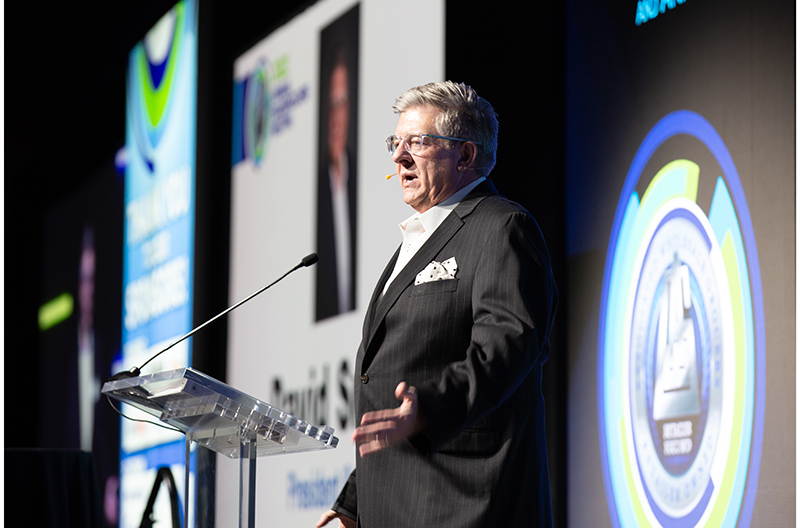“It’s been a good ride.” Reflecting on his 48-year career in the grocery industry and upcoming retirement, David Smith, president and CEO of Kansas City-based Associated Wholesale Grocers, said it will be the people he will miss the most – co-workers, AWG member retailers and vendors.
Shelby Publishing is inducting Smith into its Food Industry Hall of Fame, and he recently reflected on his career and the bright future he sees for AWG as new leadership prepares to take the reins.
Smith said August marked 48 years since he earned his first paycheck in the grocery business. The Tennessee native started out in lower-level jobs and worked his way up to running retail stores. In 1986, he sold his company.
“At that point, I was kind of looking around. I did a couple of short stints helping out some other retailers. By the end of the year, I started to work for a wholesaler called Malone & Hyde.”
Malone & Hyde was the wholesaler that had supplied Smith’s business.
That wholesaler later was acquired by Fleming Co. While at Fleming, Smith said he worked a variety of jobs before finding his niche in retail development. He helped retailers with building, buying and remodeling stores. He later worked in sales for a time before being named to head the Nashville division in the late 1990s.
A turning point in his career came on April 1, 2003, when Fleming filed bankruptcy.
Darkest of days
Smith said from the day that Fleming filed for bankruptcy until August 2003, those were “the darkest days for me in my career.” He was in charge of the Nashville division but had no answers for employees or retailers who were looking to him for guidance.
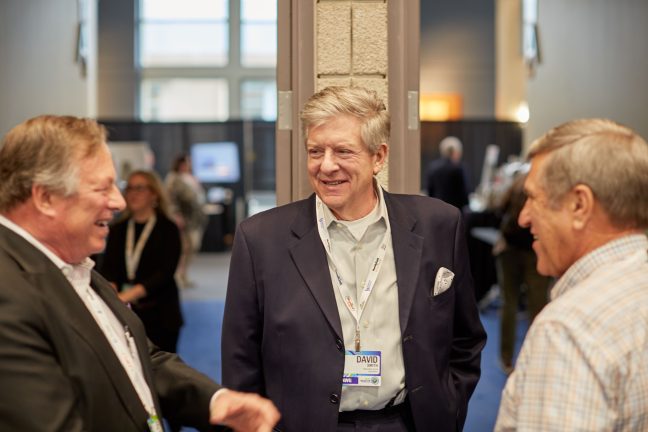
“It was a difficult, difficult time. I made my mind up early that my No. 1 role was to help everybody every way that I could. Some things were unorthodox in a lot of ways. We made a lot of arrangements for competing wholesalers to be able to get groceries to our stores. I wrote many reference letters for employees that I really needed. They felt compelled that they needed to go on and find something because they just couldn’t stand the wait. It was like a dagger in the heart to see them go, but I had to do right by them. Those were the darkest of days.”
Also at that time, the U.S. was “still reeling from the aftermath of 9/11, and the country was kind of shell shocked. We had started the Gulf War. A lot of things were uncertain.”
Smith said he recalls going outside each week with other employees in the administrative office to gather around the flagpole. There, they would talk about whatever was on their mind, share their worries and then have prayer.
“I think that the experience of that, and going through such a protracted battle, helped me appreciate people. It helped me also to have a disdain for greed. It was nothing but greed that had bankrupted our company.”
According to Smith, the company had done whatever it could to make itself look successful in order to spike shareholder interest and drive stock value.
“I don’t have very much of an appetite for that and will never have an appetite for that. I believe in transparency, and I believe in honest dealings. I believe in leading the old-fashioned way and not trying to use smoke and mirrors and illusionary tactics to try to find favor from shareholders.”
That period was a critical time for him and, as difficult as it was, he learned from the experience.
“I learned a lot about what not to do. The people and the impact and the toll that it had on people, in the way that it caused them to worry, I vowed to never, ever put people through that. I’ve tried to always be careful, never to hire more than we need, never to overextend ourselves to where we would have to go through and have broad cutbacks and, as a company, to really place value on the ones that make things happen, and that isn’t in the c-suite. It’s everybody else. It’s to place the value on the ones that really get things done.”
AWG ended up buying the Nashville division of Fleming, along with its Memphis division. Smith started working for AWG at that time. Drawing on his experience with real estate and development, he continued working in that area until 2007. At that time, he went back to the Nashville division for about a year, then moved to Memphis.
“In Memphis, we just experienced this explosive growth, especially down south.”
When he was offered the opportunity to head up a new division, Gulf Coast, he took it. AWG broke ground on the new facility in Pearl River, Louisiana, in 2011 and it opened for business in January 2013. The new division became very successful.
In 2014, Smith said he was approached about moving to the corporate office in Kansas City to take on the role of chief operating officer following the retirement of Mike Rand. He moved in August and became COO the next year. About mid-year 2015, Smith said CEO Jerry Garland announced he would be retiring. In August, the AWG board selected Smith to succeed Garland as CEO.
“The rest is kind of history, I guess.”
Love of people
One thing Smith takes great pride in is having been able to open doors or provide help to others, allowing them to achieve success.
“I look back and I think about the people that I’ve had the chance to work with along the way, and the great things that they’ve gone off to do.”
This includes employees who have gone on to lead companies, helping family businesses grow and prosper and helping many suppliers connect with independent grocers.
“If I take any pride in the highs of my career, it has to be just the privilege of being able to be a small part of the success of others … It’s been a unique role where we had an opportunity to help a lot of people. We’ve been blessed with great successes, and we’ve had some big challenges, too. The thing that I’m most proud of is, because of the unique role of the co-op, the unique role of the way our company works, because all we do is for the independent grocer, that we’ve been able to make an impact on them.”
Convergence
During his time working for voluntary wholesalers, Smith realized there was a distrust in the buy-sell relationship.
“The consequence of that relationship is the better that the supplier does, it’s at the consequence of the retailer. I get it. There’s a distrust. It’s just inherent. But whenever I came to AWG and really started to understand how things work, and that it’s a closed system and that all of our profits are given back to our retailers, one of the top things that just was burning in me was to figure out how we could start to instill more trust. I knew there was so much more that we could achieve if we could have that level of trust.”
He realized there were so many things that could be done more efficiently and effectively if the wholesaler and retailers “did more together.”
That was one of the overarching purposes of the Convergence initiative, Smith said, to “start to head up that road.”
He knew the only way to develop trust was to do what he said he was going to do, over and over again.
“You start small and you build big, and that’s what we’ve been doing. While we’re nowhere near where we need to be, we’ve already been able to drive over $50 million a year in savings for our members in cost of goods and in trade funds. That’s just a small tip of the iceberg of what we can do as we do more and more together.”
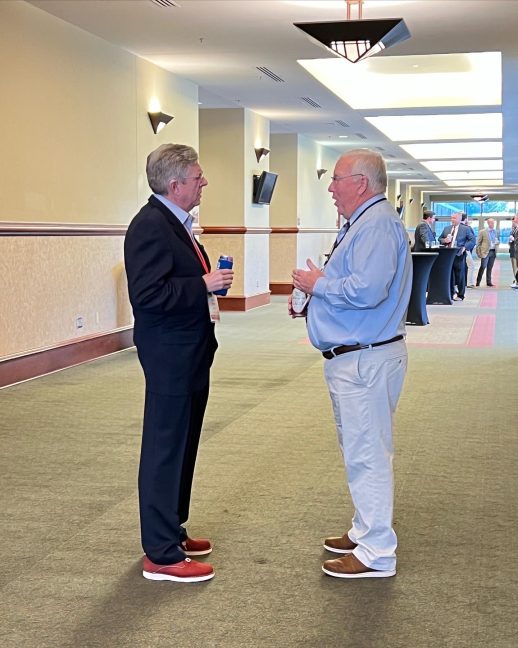
Unjust leverage
A strong advocate of the independent grocer, Smith said he is saddened at the way things have changed since the 1970s, as it relates to the relationship with suppliers and competition. He said in the ’70s, everything was very transparent.
“The companies that made products that we sold in the stores, there were efficiencies and economies of scale, and we knew how that worked. If we could only buy a case of something, we knew what the price for that would be. If we could buy a pallet of that product and could put together a mixed truck from that same manufacturer, we knew what the price would be.
“We knew what the price would be if we could buy an entire tractor trailer of a single product, which was the most efficient way for them to sell to us. We understood those things. It was as simple as doing everything we could to try to find the largest scale in order to achieve the most we could. If we couldn’t get there, we understood it. It was a challenge, the competition, being able to get there.”
Today, it is more than just efficiencies and economies of scale. There is a factor of unjust leverage, according to Smith. This is due to the very largest retailers having the ability to “put a supplier out of business if they turn on them.”
“That’s one thing that we have to advocate to change or else we’re not going to have supermarkets anymore. We’re not going to have independently owned, neighborhood supermarkets. We’ll just have chains where they choose to go, and we’re going to have all kinds of areas of the country that are just going to be devastated because they’ll lose their local grocer.”
Smith said independents are not looking for a handout but for “a clean shake.”
“If we can buy in the same efficiencies, in the same levels and quantities as a competitor, I should be entitled to buy the same way as anyone else. That’s how I believe, and I believe that it should be transparent. The nice thing about it is that the manufacturers would like to be like that, too.”
However, he noted that many large and small suppliers, in their 10K and 10Q reports about risk, cite the concentration of the largest retailers as their No. 1 risk factor.
“They cite that because they say that those largest retailers, if they decided to eliminate the product lines from their stores, they could put the companies out of business and that’s their largest risk.”
Per Smith, there is a term for companies exerting that kind of leverage.
“If that happens, and it happens to me or you, just in life, they call that extortion. It’s when someone is able to say, ‘You do this or I’m going to take this action,’ and it’s some action you can’t hold up under, it’s something that is devastating to you. So the only time you act in a way that’s not in your own best self-interest, you’ve been extorted.”
He said the theory that competition is good as long as it saves the consumer money has led to businesses turning their heads to this practice.
“I agree with that, to a point. That’s a snapshot in time. What we’ve learned – and we learned a lot about it during COVID – is that even if those largest chains are lowering prices in the short run to eliminate competition, when they’ve eliminated the competition and the independent grocer and the local grocer and regional chain has left, they raise their prices in perpetuity. So the savings, the illusion that the consumer was being helped, they were being helped but only for a season. And when that season was over, the prices went up forever because they were left unchecked.”
Smith said there are no checks and balances anymore. That’s why he and others have been advocating for enforcement of the Robinson-Patman Act.
“I’ve been very pleased that there’s been traction on that. I’m hopeful that’s something that will continue, and I believe that it will. A lot of people, they’ve woke up because it’s not only about trade funds or promotional dollars or cost of goods. It’s also just outright supply, where the big guys get the product, little guys get none. It’s all kinds of things, the way that it manifests itself, and we’ve seen it at its worst during COVID. Consumers deserve better, and I’ve seen what happens when small towns, even county seats, lose their supermarket. It’s not good.”
The Robinson-Patman Act was established over the supermarket business, Smith said, so the large chains could not use their leverage to try to eliminate competition. However, in the 1980s the theory that “competition is good, as long as it saves the consumer money” became popular and the law was not enforced.
Smith said the federal government, for decades now, has considered Robinson-Patman “an antiquated law, because they really thought that economies of scale were at play and the strongest shall survive, and really, that’s not what it’s about. It’s when these companies get so large that they can leverage these suppliers, then the suppliers are left with no other alternative.”
He said there is a clear strategy where the largest of chains eliminate competition in an area, then use those profits to target areas where they still have competition “so that they can eliminate more and more competition in a systematic way.”
The Robinson-Patman Act, along with the Sherman Act, are two laws that are on the books to eliminate or to prohibit these type of actions but haven’t been enforced in four decades, Smith said.
The issue, which is being championed by the National Grocers Association, is being talked about by lawmakers. Smith has testified on the issue before the U.S. House, Senate and joint committees. He also said he met individually with every member of the Federal Trade Commission, the governing body with oversight of the matter.
“I’ve talked with the Judiciary Committee. I’ve talked with anybody that would listen to me, or talk to me, pretty much.
“I would love to be positive and say that something will be done, but unfortunately, we know that it’s politically charged, and big companies have a lot of money. They have a lot of lobbying power that can persuade support and keep things like this from getting ahead.”
Smith said he is hopeful, but he is a realist.
“As far as going forward, I have the ultimate confidence in the National Grocers Association and in their leadership and the efforts that they’re leading. So many people are working on this. It’s not a sole person crusade. They’ve got tremendous momentum and so many great retailers that have been standing up for this.”
There has been some legislation passed that is beneficial to independent grocers, and there are several areas that are getting good momentum from industry support. While he will not be involved as much after retirement, Smith said he is happy to help if called on.
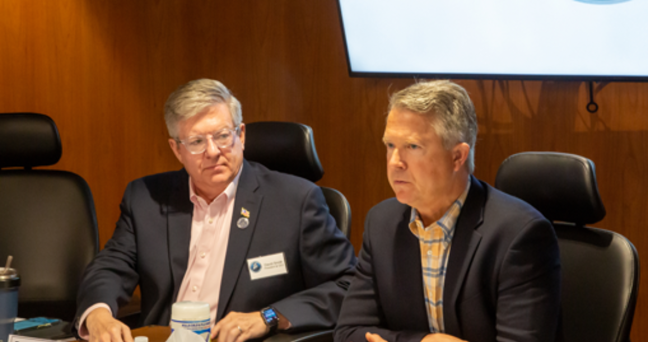
“This is a lifelong passion, and you don’t give things up that you believe in. I know that the ones that are even more qualified are behind me. I’d love for them to stand on my shoulders and be able to take us to a higher level and even maybe get something over the finish line. But I feel like I’ve been on a relay race, and I just carried that flame for a distance. And the ones that have taken it from me, they’re the ones that are taking the key leg of the race, so I know they’re going to do great.”
New leadership
Those coming behind him at AWG include his successor Dan Funk and a strong executive leadership team. Smith had set a “window of time” for his retirement with the board of directors eight years ago. In 2020, he set a specific date and started succession planning.
Smith said when he became CEO, one of his goals was to broaden the span of leadership. He wanted to put together a “high-functioning leadership group that worked together but challenged each other, and to be better prepared for growth.”
Having worked together for several years, Smith said Funk is “wicked smart.”
“His background in merchandising and operations far exceeds anything that I’ve ever had. I’ve worked with him for 12 years, and I know what he’s capable of doing. He, along with the rest of his team are going to achieve much more than we’ve ever achieved.”
Smith said AWG had “tremendous leaders” in the past, and he wanted to build on their strengths by putting together a team that, collectively, had more experience, skill and intellect than just one individual.
“It was more about going to a team approach. In 2015, we put together an executive leadership team, which is the key leaders at AWG in all departmental areas, and most of us have been together since that start in 2015. For eight years, we’ve all been working together.”
There have been a few retirements and recent new additions, including some “extraordinary leaders” who are positioned to have a tremendous impact on AWG’s future, Smith said.
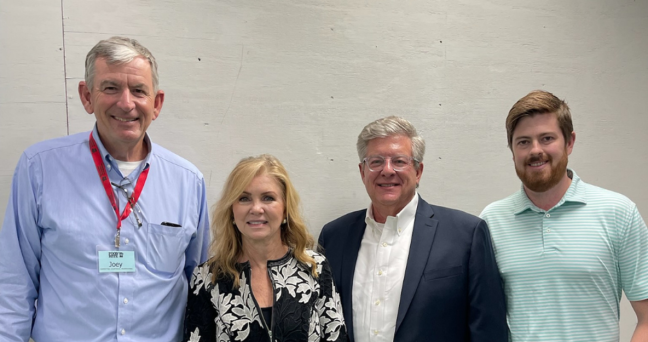
Derek Jones recently was hired as EVP, division operations. Jones was the “unicorn” Funk was looking for to fill that position, Smith said. Funk had said he wanted someone with a retail background but also had worked in wholesale, had been in charge of warehousing and distribution and also had been in charge of everything from procurement to sales to customers and more.
“We were so blessed to find Derek… He was a perfect fit for us, and he’s going to be a fantastic asset to really supplement Dan and this new leadership team.”
Smith said AWG has been blessed over the years with people who were able to build long and lasting relationships with independent grocers. Recent hire James Neumann is one such person. As SVP of special projects, Neumann will be AWG’s retail advocate.
He joined AWG after serving on the board for 13 years as a member retailer. He and his brother owned stores in Louisville, Kentucky. He left the company to join AWG, with his brother and brother-in-law continuing in the family business. Smith said he believes Neumann will be “fantastic” as retail advocate and can’t wait for all AWG members to get to know him.
“He is going to be that face that people remember and associate with AWG.”
Tye Anthony is leading the merchandising team, which Funk previously oversaw. Anthony, with support from Funk, will “accomplish great things in both Convergence and all things that have to do with helping our stores be more competitive at retail.”
Richard Kearns, who is over warehousing and distribution, is “absolutely brilliant,” Smith said. He is helping transform those operations from being so labor intensive to a more sustainable model by leveraging automation and technology. AWG will be continuing that transformation “on a pretty quick pace,” as it already has commitment for more automated facilities, such as the all-in-one warehouse in Hernando, Mississippi.
“We’ve got lots of work to do in transitioning to those type of facilities. What that’s going to mean for our member retailers long term is going to be fantastic, because it will alleviate the worry of what happens when the hurricanes come in, and what happens when we have another virus or when we have labor shortages.
“We’re able to operate and have a sustainable supply chain and have the advantage of having groceries on the shelf when others may be challenged by a number of things. It’s going to give us a lot of redundancy. It’s going to give us a lot of flexibility and just be a great, great thing.”
Shelly Moore, chief information officer and head of technology, has been with AWG for two years, and “she has such a tremendous road map.”
AWG is investing several million dollars in modernizing its technology platform to better serve its member retailers, “to just make it easier for them running their respective businesses.”
Pat Reeves leads the human resources area for AWG. “He’s a tremendous leader and helps us form the culture that AWG has, and to attract and retain the best and the brightest. We’ve been very, very fortunate that we’ve been able to get fully staffed in all of our facilities and locations. I know that many of the strategies that he leads that are implemented throughout is making a difference.”
Gary Koch, chief financial officer, is “our rock,” Smith said. He is the longest tenured member of the executive leadership team and will serve as Funk’s right arm, Smith said.
As a co-op, what AWG does for one member, it does for all members. While all members are equal, it is important to know and understand that no two are the same, Smith said, which provides both challenges and opportunities. The company must walk a fine line there and be really good stewards.
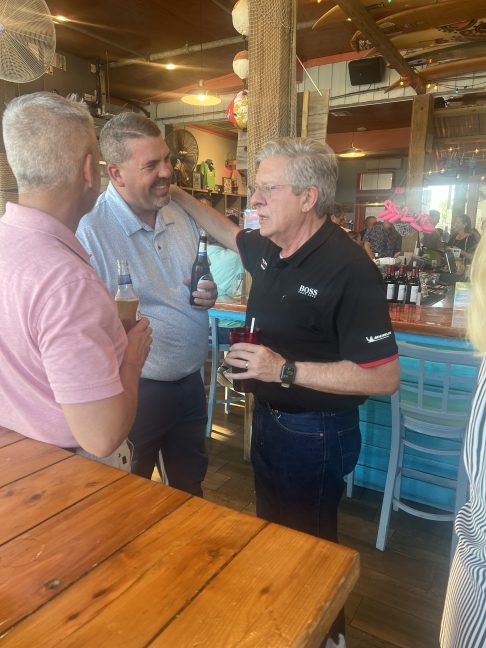
“Gary and Dan will be a tremendous partnership in doing that. Gary’s also a great steward in financial performance. Since all our profits go back to our member retailers, it’s really important that we make our numbers every year, and we’ve been blessed to be able to do that and maintain that performance for the last couple of decades. We’ve never missed a year as far as having met or exceeded our patronage targets that we have for our members, so it’s really worked out well for us.”
Rounding out the leadership team are Stephanie Becker, chief legal officer; and Emile Breaux, SVP, chief sales and support officer.
Smith has great confidence in this team moving AWG and its member retailers forward.
“I believe that one of the many things that people look at AWG and expect from us is continuity … The things that we do are very consequential for our members, so we want to make sure that they’re a part of it and that we communicate well, so it’s never a secret. This has all been very deliberate. I’ve always known that after my bag of tricks is empty and I’ve done what I can do, it’s time for me to step aside and for someone else to take us to a higher level. That’s what Dan’s going to do.”
Smith said he believes AWG’s “explosive growth” will continue.
“I can only imagine where we will be 10 years from now. It exceeds even my imagination of where we will be, because that’s the kind of people we’ve got that’s in this next round of leaders.”
Reconnecting with family
Smith and his wife Tammy have been married for 41 years. They have two children: son Cody, 36, and his wife Tia; and daughter Blakelee, 35. In 2019, he and Tammy bought a house in Cookeville, Tennessee, for their retirement home.
Both children are back in the Volunteer State, which is Tammy’s dream to have the family nearby.
As for what he expects in retirement, Smith said he isn’t sure.
“It’s a lot like going on a vacation you plan for your entire life. You’re going to a destination you’ve never seen, and you don’t know what it’s like when you get there. But it’s something that you really longed for, all this time. There’s some anxiety. I’m sure Tammy has some level of anxiety as well, because for our 41 years, I’ve been away at least part of the time.”
He said his biggest regret over his career is the time he missed being with his wife and children, adding that he sometimes did not “do as good a job as I should have with my priorities of placing God first, my family second and my work third. I’ve made the mistake of getting out of alignment many, many times, and I need to make that right.”
He said being home will be an adjustment for everyone. “There’s probably a fine line where enough of me is enough and too much is too much. As I learn where that line is, I’ll plan not to exceed that line.”
He said on a recent weekend at home, he was talking with his wife and daughter.
“My wife commented to my daughter and said that, come first of the year, I was going to learn about boot camp. I’ve never been in the military, but I can imagine that must mean that I’m getting ready to go through some sort of an intensive makeover to establish new discipline. I look forward to that.”
Smith said that, at 62, his “model year’s not that bad, but my mileage is pretty bad.”
He has had a good career, but it’s the friends he made along the way that he cherishes most.
“Those friends, that’s the thing that I’ll take with me to the grave. My last memory will be the great people that I’ve gotten to work with in this business.”
Read more wholesaler and distributor news from The Shelby Report.

